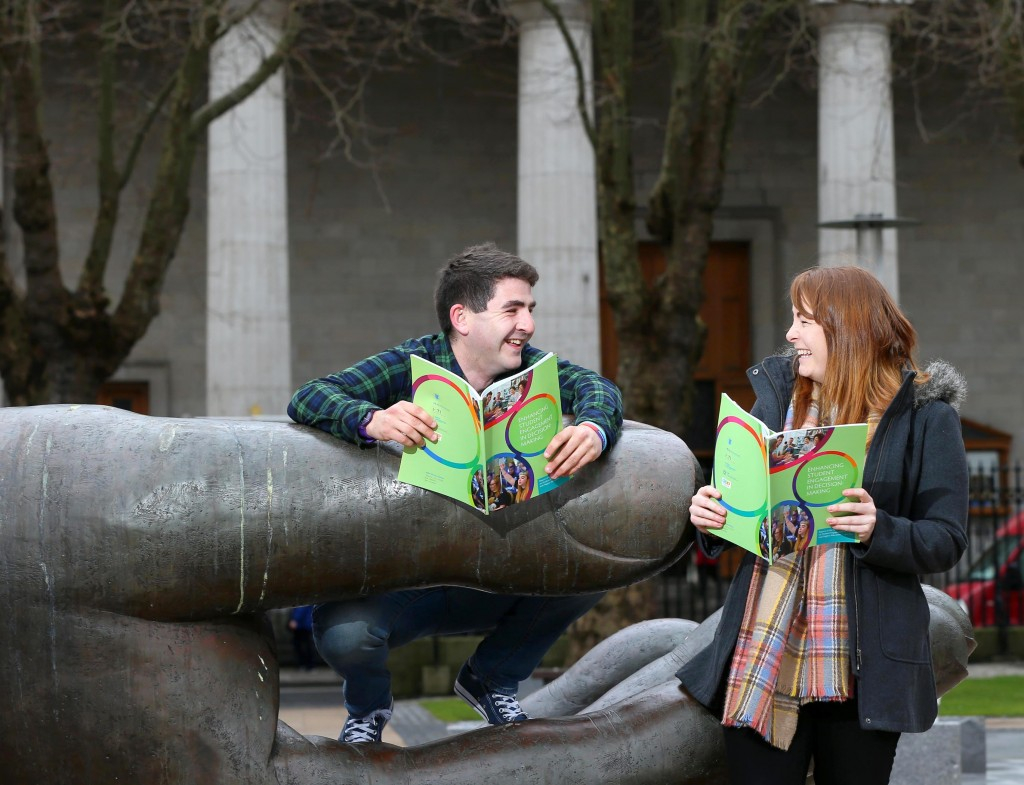Students must be centrally involved in decision-making processes in higher education institutions. That’s according to the Higher Education Authority (HEA), which today (14.04.16) published the report of the Working Group on Student Engagement in Irish Higher Education.
The Working Group was established by the HEA in 2014 to develop a set of principles to assist higher education institutions in enhancing student engagement. It was chaired by Professor Tom Collins.
Launching its report today at a conference on student engagement in the Department of Education and Skills, Professor Collins said: “Student engagement essentially means student involvement in governance and management, quality assurance, and teaching and learning.
“While students are ultimately responsible for their own learning and level of engagement, effective student engagement also depends on institutional conditions, policies and culture that enable and encourage students to get involved. The benefits of effective student engagement can include better retention rates, higher levels of satisfaction with educational outcomes, and better student / staff relationships on college campuses.”
Students as Partners, not Consumers
Professor Collins said that the Working Group favoured the “developmental model” for Irish higher education institutions, over the “market model” common in many jurisdictions. The market model is based on a view of the student as a consumer while, in contrast, the developmental model sees students as partners in a learning community, with both the rights and responsibilities of citizens.
Recommendations
The report of the Working Group recommends that all higher education institutions complete a co-led (staff and student) evaluation of formal and informal student engagement practices and opportunities at every level. Once the self-evaluations are complete, institutions and students should co-author a student engagement policy that places the principles included in the Working Group’s report at the heart of each institution. The principles include: democracy, transparency, inclusivity and diversity, feedback, professionalism and collegiality.
Commenting today, Tom Boland, Chief Executive Officer of the HEA, said: “Achieving successful student engagement is not about enforcement and compliance; it’s about building up a meaningful culture and two-way communications.
“Student participation in higher education governance in Ireland is a legal requirement, but representation on various governance bodies is not sufficient on its own. Both formal and informal mechanisms, as well as parity of esteem between students and staff, are extremely important. The culture of engagement must incorporate all staff and students, and reflect the diversity of the student body, incorporating mature, part-time, distance learning and international students.”
Speakers at today’s conference included Professor Stuart Brand, Director of Learning Experience at Birmingham City University, and Marese Bermingham, Head of Strategic Student Engagement and Retention at Cork Institute of Technology (CIT). Both institutions were consulted by the Working Group on Student Engagement due to the high quality of their existing student engagement practices.
The full report of the Working Group on Student Engagement, including the principles developed by the Group, is available here: HEA IRC-Student-Engagement Report-Apr2016
Report Flyer: HEAIRC-Engagement-Insert
ENDS
Media Contact: Martina Quinn / Niamh Breathnach, Alice PR & Events, Tel: 087-6522033 / 085-1461231
 — Pictured at the launch of the report of the Higher Education Authority working group on Student engagement in Irish Higher Education were students Sean Walsh and Lisa Dolan both students from IT Tralee Pic: Marc O'Sullivan
— Pictured at the launch of the report of the Higher Education Authority working group on Student engagement in Irish Higher Education were students Sean Walsh and Lisa Dolan both students from IT Tralee Pic: Marc O'Sullivan
Additional Notes:
The HEA is the statutory planning and policy development body for higher education and research in Ireland. It was established to allocate public funding to Irish higher education institutions; to oversee performance of the higher education and research sector generally; and to advise the Minister for Education on the development of the sector. Further information is available at: www.hea.ie or on Twitter, @hea_irl.
Student Engagement Case Study: Cork Institute of Technology
At CIT, a Strategic Student Engagement and Retention Initiative was established in September 2012. It works with academic faculty, school and departmental staff, and student services to develop proactive and collaborative strategies aimed at improving student engagement, progression and graduation. The institution made a strategic decision to increase its focus on student engagement because of a range of factors, including greater student numbers, the increasing diversity of the student population, and an awareness that better student engagement could lead to increased retention rates.
A number of student engagement programmes are run each year at CIT, including the ‘Good Start’ induction programme for new students; ‘Just Ask!’ information and support campaigns; ‘Get Connected’ events involving students and academic staff; and a peer-assisted learning and support scheme, which fosters cross-year support between students on the same course. In addition, the institution has established an Academic Learning Centre to give students free learning support in areas that are traditionally found challenging. An early alert and intervention scheme is also underway – to help new students transition successfully to third level and to ensure they are supported to successfully complete their studies.
“The student engagement initiatives at CIT have had a tangible impact,” says Tom Boland. “On any visit to the campus, you can see evidence of how students are meaningfully engaged in decisions affecting their learning. A number of the student retention and support initiatives that are now in place came about directly because of suggestions made by students themselves. This is the type of meaningful student engagement that we would like to see on campuses across Ireland.”